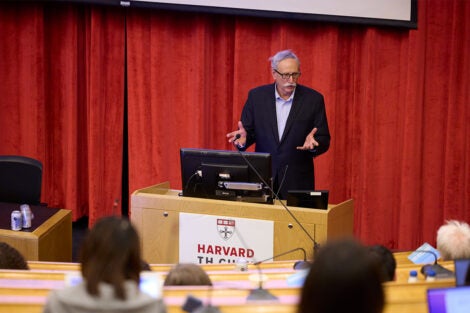May 9, 2024 – In the 1970s, researchers first noticed an interesting trend in cancer data: disease rates in countries around the world varied greatly, even when taking into account biological differences between populations. One hypothesis was that the differences in cancer rates occurred due to environmental factors—in particular, variations in diet. Indeed, when researchers compared population-level data about food intake, they found that consuming fats and oils was associated with developing cancer.
“Based on not much more than this evidence, dietary guidelines across the United States and across the world emphasized reducing fat in the diet,” said Walter Willett, professor of epidemiology and nutrition at Harvard T.H. Chan School of Public Health, speaking on May 3 at the 8th Cutter Symposium.
But since then, according to Willett, study after study has found that the association between dietary fat and cancer rates does not hold up. One rigorous study, conducted in the 1990s to early 2000s, involved tens of thousands of individuals and directly compared those who reduced the amount of fat in their diets with those who did not. After collecting data from the individuals for several years, researchers did not find a significant reduction in breast cancer in the low-fat diet group.
“Clearly, if you put the data together, [the link] is very, very null,” said Willett. He noted that subsequent studies investigated specific types of dietary fats, rather than grouping them all into one category. In general, the studies found that trans and saturated fats led to higher disease risks, while unsaturated fats did not. Importantly, the results depended on data analyses that controlled for hidden, so-called confounding factors other than diet that contributed to disease—something that the 1970s research did not address.
The symposium focused on one of the major challenges of obtaining accurate results in nutrition studies—the role of confounding factors in studying the impact of diet on disease.
Organized by the Department of Epidemiology, the Cutter Lectures on Preventive Medicine are held once or twice a year, funded by a bequest from John Clarence Cutter, a graduate of Harvard Medical School.
Need for careful data analysis
In nutrition studies, when researchers analyze data and find a potential connection between diet and disease risk, they need to account for confounding factors that might be responsible instead, according to the symposium speakers, who included Donna Spiegelman, Susan Dwight Bliss Professor of Biostatistics at the Yale University School of Public Health, and Richard Peto, emeritus professor of medical statistics and epidemiology at the University of Oxford.
Spiegelman explained that people who have healthy diets may also follow healthy lifestyles in general, which include aspects like exercising, refraining from smoking or drinking alcohol, and seeing a doctor regularly. She said that if confounding factors such as these are not measured and analyzed accurately during studies, the results may not show the true impact of diet. She has developed statistical methods and software to help address issues of confounding.
Still, Spiegelman concluded that despite the challenges of determining precisely how different diets affect disease risks, the collective body of studies in the nutrition field shows that diet does indeed have an impact.
“For me, the diet-health associations are so strong that I have moved on to implementation research to translate the knowledge already in place to improve public health,” she said.
– Jay Lau
Photo: Kent Dayton
